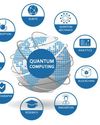
Quantum computing is a new and developing area of computer science that can solve problems that even the most potent classical computers cannot. Quantum hardware and quantum algorithms are two of the many disciplines that make up the field of quantum computing. Quantum technology is still in its infancy, but it will soon be able to solve complicated problems that supercomputers cannot or can't solve quickly enough.
The histories of classical and quantum computing are closely related. Physicists were among the first to use computers to carry out exacting calculations after early access to early modern computers, which were created in labs and universities all over the world. However, the limitations of classical computers were recognised by quantum physicists. According to the famous theorist Richard Feynman, classical computers, including supercomputers, could only be used to further quantum technologies to a certain degree because no classical system could be used to comprehend the behaviour of even slightly complex quantum systems.
The cutting-edge field of quantum computing uses the ideas of quantum mechanics to process data in ways that are essentially distinct from those of traditional, or classical, computing. Quantum computers use quantum bits, or qubits, which can exist in multiple states simultaneously, in contrast to classical computers that process information in binary form, representing data as either Os or 1s. This special property creates new computational opportunities by enabling quantum computers to complete some tasks tenfold faster than classical systems. Cryptography, material science, artificial intelligence, and complex optimisation are just a few of the domains that will be greatly impacted by quantum computing.
Key concepts in quantum computing
This story is from the December 2024 edition of Open Source For You.
Start your 7-day Magzter GOLD free trial to access thousands of curated premium stories, and 9,000+ magazines and newspapers.
Already a subscriber ? Sign In
This story is from the December 2024 edition of Open Source For You.
Start your 7-day Magzter GOLD free trial to access thousands of curated premium stories, and 9,000+ magazines and newspapers.
Already a subscriber? Sign In

Linux Foundation launches LF India to foster open source innovation and support in India
The Linux Foundation, a nonprofit organisation dedicated to driving innovation through open source, has announced the launch of LF India.

Red Hat launches Ansible Automation Platform Service on AWS
Red Hat, Inc., has announced the general availability of the Red Hat Ansible Automation Platform Service on Amazon Web Services (AWS) as a managed offering available through AWS Marketplace.

Fedora Asahi Remix 41 is now generally available
The Fedora and Asahi Linux projects have announced the general availability of Fedora Asahi Remix 41, the latest version of this distribution tailored for Apple Silicon Macs.

SageMath: A Second Glance at Cybersecurity
The eighth article in the series on SageMath explores a classical encryption scheme called the Rail Fence cipher and introduces the concept of symmetric-key encryption.

Building Cross-Platform Mobile Apps with lonic
Mobile apps are an intrinsic part of daily life today we use them to order food, groceries, taxis, and more. As these apps need to work across platforms, developers are focusing on cross-platform app development so that they code only once to create apps that function on multiple platforms. lonic is a framework that can help developers build apps faster than with native app development, while saving them time and money. Let’s learn how to install and deploy it.

Open Source AI Frameworks: Integrating AI with lot
Open source Al helps loT devices learn, adapt, and automate actions based on real-time data, improving convenience and security. Here’s an overview of six key open source Al frameworks that help integrate Al with loT, and the challenges they face.

Open Source loT: A Primer for Everyone
Open source IoT platforms promise to play a central role in shaping the future, making it possible for more people and businesses to benefit from smarter, more efficient solutions. We look at a brief history of this tech and explore emerging trends.

Using Open Source and Blockchain to Build Decentralised loT Networks
Explore how blockchain is being integrated with loT to create decentralised networks. Find out how leading open source projects like IOTA and Streamr use blockchain to ensure data integrity, security, and privacy in loT ecosystems.

Internet of Things: Running Language Models on Edge Devices
Let’s delve into the technical aspects, challenges, and benefits of deploying language models on edge/loT devices.

How Open Source is Making Quantum Computing Accessible to Everyone
Open source initiatives are breaking down the barriers to quantum computing, making it accessible to everyone. Explore what quantum computing is, the challenges of traditional adoption, how open source platforms are democratising the technology, and how you can get started in this exciting domain.